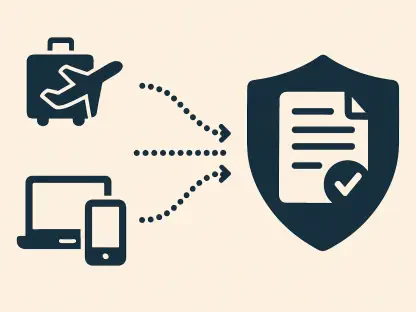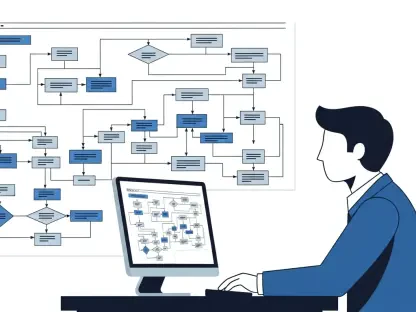Introduction to Ethical Broking and Third Sector Challenges
Imagine a small charity in a bustling community, tirelessly working to support vulnerable families, only to face a devastating cyberattack that compromises sensitive donor data. Such scenarios are increasingly common for third sector organizations—charities and social enterprises—that operate with limited resources yet bear immense responsibility. These entities grapple with mounting financial constraints, operational hurdles, and sophisticated digital threats in today’s landscape. Ethical broking emerges as a beacon of hope, offering not just insurance solutions but a values-driven approach to risk management that prioritizes mission over profit. This specialized practice stands as a critical ally, ensuring that these organizations can focus on impact without being derailed by unforeseen crises.
The challenges facing the third sector are more pronounced than ever. Budgets are stretched thin, often leaving little room for comprehensive risk mitigation strategies. Operational complexities, such as managing volunteers and complying with regulations, add layers of vulnerability. Meanwhile, the rise of digital tools has introduced data-related risks that many organizations are ill-equipped to handle. Ethical broking steps into this gap with a commitment to integrity, tailoring support to safeguard the core purpose of these vital groups.
Understanding Ethical Broking in Context
Ethical broking represents a deliberate shift from the traditional, profit-centric insurance models that dominate the industry. Originating as a response to the disconnect between corporate gain and societal good, this approach redefines the broker’s role by embedding values into every decision. It focuses on aligning services with the ethos of clients, particularly in the third sector, where missions center on community welfare rather than financial returns. This philosophy has gained traction as a meaningful alternative, resonating with organizations that seek partners who share their principles.
The rise of values-led practices in insurance reflects a broader industry trend toward accountability and trust. Brokers adopting this model often work exclusively with clients whose goals mirror their own, ensuring that advice and solutions are not merely transactional but deeply purpose-driven. For charities and social enterprises, this means partnering with professionals who understand the unique pressures they face and prioritize sustainable outcomes over quick profits.
Key Contributions of Ethical Broking to Third Sector Missions
Ethical broking offers transformative support to third sector organizations by delivering sustainable risk management and purpose-aligned guidance. Unlike conventional models that may push generic policies, this approach customizes strategies to address specific vulnerabilities, ensuring that resources are used effectively. Real-world cases, such as a charity facing a liability claim due to a governance oversight or a social enterprise hit by a data breach, highlight the tangible benefits of ethical practices in averting disaster and preserving trust.
Enhancing Governance
Governance failures often lie at the heart of liability issues for third sector entities, especially when trustees or volunteers lack clarity on their roles. Ethical broking tackles this by advocating for structured frameworks, including defined responsibilities and thorough documentation. Such measures create a robust defense against claims while fostering accountability within the organization.
Additionally, training programs supported by ethical brokers equip staff and volunteers with the knowledge to navigate legal and operational duties. By emphasizing proactive steps, such as regular audits and clear agreements, this approach minimizes risks that could undermine a charity’s mission. The result is a stronger foundation that allows focus to remain on community impact.
Mitigating Cyber and Data Risks
Cyber threats and data liability pose growing challenges for third sector groups, many of which handle sensitive information with limited technological defenses. Ethical broking plays a pivotal role by promoting best practices in data stewardship, guiding organizations through the steps needed to qualify for cyber insurance even if immediate coverage is unaffordable. This preparation inherently reduces exposure to digital risks.
Beyond insurance, the emphasis is on building a culture of vigilance around data handling. Ethical brokers advise on practical measures like secure storage and staff training to prevent breaches that could erode public trust. This forward-thinking stance ensures that organizations are not just reacting to crises but actively safeguarding their operations.
Prioritizing Long-Term Impact
A hallmark of ethical broking is its focus on long-term sustainability rather than short-term financial gain. This means crafting risk management plans that align with the enduring goals of charities and social enterprises, ensuring they can operate without constant fear of disruption. Such an approach reinforces the sector’s ability to deliver lasting change.
By embedding mission alignment into every recommendation, ethical brokers help organizations avoid pitfalls that could compromise their work. This commitment to enduring impact sets a standard for partnerships that genuinely contribute to societal good, rather than merely addressing immediate needs.
What Sets Ethical Broking Apart?
Ethical broking distinguishes itself through a set of unique principles that prioritize integrity over expediency. Strict client selection criteria ensure that brokers work only with organizations whose values resonate with their own, fostering genuine collaboration. This selective approach contrasts sharply with conventional models that often chase volume over compatibility.
Another defining trait is the rejection of price-driven marketing, opting instead for deep community engagement. Ethical brokers invest time in understanding local needs and building trust, rather than competing on cost alone. This focus, coupled with a dedication to tailored solutions, positions them as true partners in advancing third sector goals.
Current Landscape of Ethical Broking for the Third Sector
Today, ethical broking occupies a niche yet impactful space within the insurance industry, with firms like Talbot Jones leading the charge in serving charities and social enterprises. Based in the northeast of England, this specialist brokerage exemplifies the values-led model by maintaining a limited client base to ensure high-quality service. Recent developments show a growing demand for such personalized approaches as third sector risks become more complex.
However, the broader market context presents challenges, with industry consolidation often favoring larger, less specialized entities. Maintaining a values-driven focus in this competitive environment requires resilience and innovation. Despite these pressures, ethical broking continues to carve out a vital role by addressing the nuanced needs of community-focused organizations.
The ongoing efforts of smaller firms demonstrate a commitment to balancing profitability with purpose. By adapting to emerging risks while staying true to core principles, ethical brokers remain essential allies for the third sector, navigating a landscape where integrity can sometimes be at odds with market trends.
Reflection and Broader Impacts
Ethical broking’s influence on the third sector extends beyond immediate risk management, shaping how organizations build resilience and maintain public confidence. Its emphasis on tailored solutions fosters a sense of security, allowing charities to pursue ambitious goals without constant fear of setbacks. This model also sets a precedent for how business can intersect with social good in meaningful ways.
Reflection
The strengths of ethical broking lie in its customized support and deep-rooted community focus, which ensure that advice is both relevant and impactful. However, scalability remains a hurdle, especially in a market trending toward consolidation where smaller firms may struggle to compete. Balancing growth with values alignment is a persistent challenge that requires strategic foresight.
Despite these obstacles, the dedication to client fit over volume offers a refreshing counterpoint to industry norms. This approach not only benefits individual organizations but also elevates standards for what ethical business can achieve within constrained environments.
Broader Impact
Looking ahead, ethical broking holds potential to reshape the insurance industry by inspiring a shift toward values-led practices across sectors. Its focus on trust and sustainability could encourage other fields to adopt similar models, prioritizing societal benefit alongside financial success. This ripple effect may redefine professional services in community-driven contexts.
Furthermore, the emphasis on integrity enhances societal trust in both the third sector and the businesses that support it. As more industries recognize the value of purpose-driven strategies, ethical broking stands as a blueprint for combining ethics with efficacy, paving the way for broader systemic change.
Conclusion: The Path Forward for Ethical Broking
Reflecting on the journey of ethical broking, it is evident that its commitment to integrity has profoundly strengthened the third sector’s ability to navigate complex risks. By embedding values into risk management, this approach has empowered charities and social enterprises to uphold their missions amidst daunting challenges. Moving forward, stakeholders should actively seek partnerships with ethical brokers to build robust frameworks for governance and data protection. Exploring collaborative initiatives between brokers and third sector networks could further amplify resilience. As new risks emerge, championing values-led practices will be crucial to ensuring that community impact remains at the heart of every endeavor.









